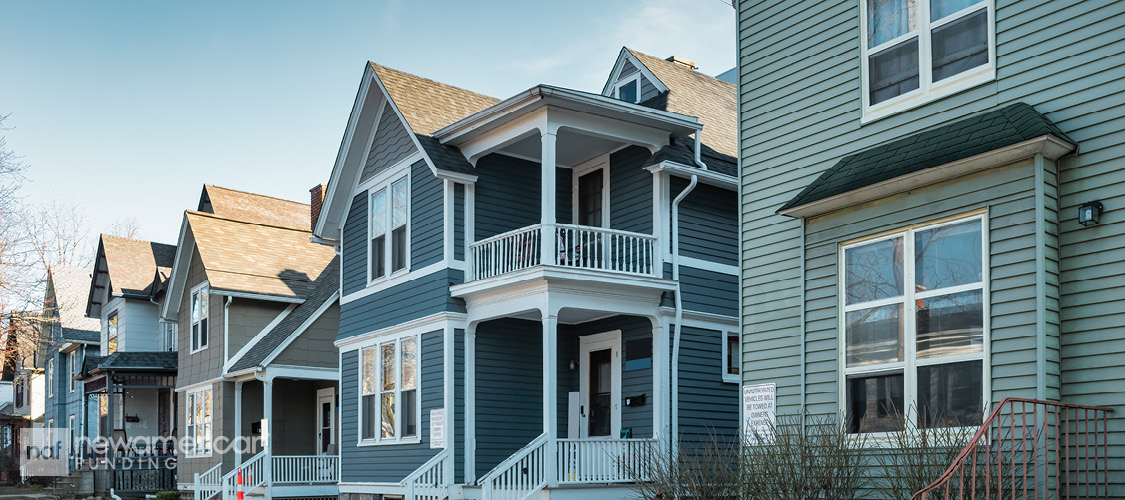What is a Michigan FHA Loan?
From the cultural energy of Detroit and Grand Rapids to the peaceful charm of small towns and lakefront properties, Michigan is a unique place to call home. With its rich history, outdoor recreation, and affordable housing in many areas, Michigan is a great place to take the next step into homeownership.
Many Michiganders dream of becoming homeowners, but worry their credit scores aren’t high enough to qualify for a mortgage or they haven’t saved enough for a down payment.
The median home sale price in Michigan was $250,000 in December 2024, according to ATTOM data.
If you find yourself in this situation, you may want to consider an FHA loan. Federal Housing Administration loans are often popular with first-time homebuyers in Michigan.
These mortgages offer lower down payment and credit score requirements than many other types of loans. This may help you to qualify for the loan—without having to put down 20% of the sale price of the home.
FHA loans were created in 1934 by the Federal Housing Administration to help borrowers with less-than-perfect credit purchase a home. Since their inception, more than 40 million people have used these mortgages to become homeowners.
The FHA is governed by the U.S. Department of Housing and Urban Development (HUD) and FHA loans are guaranteed by the U.S. government. This means that if a borrower stops making their mortgage payments, the government will help to cover the lender’s losses.
This makes FHA loans attractive to lenders because there is less of a risk of losing money if the borrower defaults. That’s why these loans don’t require as much money down.
Michigan FHA loan benefits

FHA loans are popular with homebuyers because they were designed to help those with less-than-perfect credit or who don’t have a long credit history to get a mortgage.
These loans may also be able to help people who have experienced foreclosure or bankruptcy.
Some of the benefits of FHA loans include:
- Low down payments: One of the main reasons FHA loans appeal to first-time buyers is because buyers don’t have to make a large down payment. It’s often difficult to save thousands, if not tens of thousands of dollars, for a down payment while juggling rent, car payment, student loans, and everyday living expenses.
However, with an FHA loan, borrowers may be able to qualify for as little as 3.5% down.
- Down payment assistance programs: Down payment assistance programs are available throughout the country. Each state has their own unique programs both at the state and city level.
New American Funding offers a down payment assistance program called Pathway to Homeownership. Specifically available to first-time homebuyers, eligible borrowers may receive up to $6,000* in financial assistance. This money can be used to help with your down payment, closing costs, or other costs. It can also be combined with other DPA programs.
- The Michigan State Housing Development Authority (MSHDA) has resources available for down payment assistance and homeownership programs. You can also find more state and city resources at HUD.
Buyers may be eligible for up to $10,000 in down payment and closing costs assistance through MSHDA. Repeat buyers are also able to receive the assistance if they meet the program’s guidelines.
Homebuyer assistance programs have their own sets of requirements for eligibility. It is up to the borrower to research these programs, their guidelines, and apply to them. Generally, they need to do this on their own independently of their lender.
- Gift funds can be used for down payment: You may be able to use financial gifts from friends and family to help pay for the down payment on a home.
You won’t be taxed on the money. However, the giver will be taxed if they provide more than $19,000 as an individual or $38,000 as a married couple in 2025.
- Higher debt-to-income (DTI) ratio: Homebuyers who use FHA loans may also be able to qualify for the loans even with debt. FHA loans are more generous when it comes to a person’s DTI ratio.
DTI is the percentage of a person’s gross monthly income that they spend to cover their debts. FHA loans allow a DTI as high as 57%, but not all lenders will go this high. Some require lower DTI ratios.
This often makes FHA loans easier to qualify for than Conventional loans, where the DTI can only be up to 45% to 50%.
- No monthly minimum income requirement: Borrowers don’t need to earn a minimum salary to qualify for an FHA loan. But their income must be verifiable and consistent for the last two years. That means they can’t make much more or less in one year compared to the previous one.
- A variety of loan types to choose from: There are multiple FHA loan options for homebuyers.
Buyers can choose between a 15-year FHA fixed-rate loan and a 30-year FHA fixed-rate loan. The monthly payments for 15-year loans will be higher because they will be paying the loan off in half of the time as a 30-year loan.
However, these borrowers will build more equity quicker, can often receive a lower mortgage rate, and will pay less in interest over the life of the loan.
On the other hand, 30-year loans are the most popular as they spread the loan amount over a longer period of time, making the monthly payments smaller than those on a 15-year loan.
FHA 203(k) loans allow homebuyers to fund the purchase of a fixer-upper and cover renovation costs using just one loan.
The FHA Streamline Refinance allows existing homeowners to refinance their existing loans, potentially into lower mortgage rates if rates go down.
- Some or all the closing costs can be covered by the seller: FHA loans allow the seller to contribute up to 6% of the sales price to cover the buyer’s closing costs.
Closing costs are usually somewhere between 2% and 6% of the purchase price on top of the down payment. They can include appraisal and inspection fees, a loan origination fee, and service fees.
For example, closing costs can total between $8,000 and $24,000 for a $400,000 home.
- Assumable loans: Borrowers may be able to assume an existing FHA loan in Michigan. This is when a mortgage is transferred from a seller to a buyer. The buyer will be subject to the terms, conditions, and rates of the original FHA loan.
Assumable loans are popular when the seller’s existing mortgage rate is much lower than current rates. However, you will have to buy out the seller’s equity, which may be expensive.
Generally, the loan will be for less than the purchase price of the home. This means the buyer will have to pay the seller back for what the seller already paid off on their mortgage plus home appreciation, as the home may have gone up in value since the seller purchased it.
For example, if the seller’s home is on the market for $400,000 and the mortgage is for $250,000, the buyers would have to bring $150,000 to the closing table.
- A variety of eligible properties: There are FHA loans available for single-family, detached homes, two- to four-unit homes (such as duplexes, triplexes, and quadplexes), condos, townhomes, and manufactured homes.
Michigan FHA loan requirements

The requirements to qualify for an FHA loan in Michigan will depend on the type of FHA loan you choose. That’s why it’s important to contact your lender to discuss loan specific eligibility.
Here are some general FHA loan requirements:
- A credit score of 580 or higher: A lender may accept credit scores of 500 to 579 under certain conditions. However, a credit score lower than 580 will require a larger down payment, typically 10%.
- The ability to make a 3.5% to 10% down payment: The size of your down payment will be calculated according to your credit score and other financial factors. The borrower’s credit score must be 580 or higher to have a lower 3.5% down payment.
There are multiple ways homebuyers improve their credit scores. You should check your credit report. If there are unpaid bills, you may be able to reach out to that party and come up with a payment plan. You can also pay off debt and hold off on applying for new credit cards. This can help you boost your credit score.
- Minimum of two years employment: Homebuyers in Michigan must have verifiable, steady, and consistent income. You will need documentation to prove how much money you earn. This can include tax returns, pay stubs, or W-2s. This requirement is the same for borrowers who are employees as well as those who are self-employed.
- Mortgage insurance: FHA borrowers who put down less than 20% of the sale price of the home will have to pay a mortgage insurance premium (MIP). This is mortgage insurance that protects the lender if you stop making your monthly mortgage payments.
The dollar amount of MIP will be calculated based on the amount of the loan. However, all FHA loans will require borrowers to pay an upfront MIP of 1.75%. This is in addition to monthly mortgage insurance, which is required for the life of the loan.
Recent Michigan FHA borrowers may be able to get MIP removed after 11 years, provided they made a 10% down payment when they bought the home.
Buyers who put down less than 10% for an FHA loan will pay MIP for the life of the mortgage.
- Higher home inspection standards: Homes that are purchased with an FHA loan must pass an FHA-specific inspection. The properties must be deemed structurally sound as the roof, floors, walls, and wiring must be in good condition. The doors, windows, locks, and lighting must work properly, and the home must be free of any defects that would hurt its value or make it unsafe to live in.
- FHA loan must be for a principal residential property: FHA loans cannot be used for rentals, investment properties, or vacation homes. They are also not available for business properties.
- A debt-to-income ratio of less than 57%: A person’s debt-to-income (DTI) ratio is the percentage of their gross monthly income they spend to cover debts. Debts can include student loans, credit cards, and any type of federal debt.
To qualify for an FHA loan, you cannot spend more than half of your gross income on debt. There are some exceptions. In general, however, many lenders in Michigan will want to see your debt-to-income ratio be no greater than 43%.
How do I qualify for an FHA Loan in Michigan?

To qualify for an FHA loan in Michigan, you must meet the above requirements. You must have a credit score of at least 500. Your DTI must be less than 57%. You must be able to put down a down payment of 3.5% to 10% of the purchase price.
There is no minimum income requirement, but you must be able to prove consistent income. You will be asked to provide paperwork like your personal ID and tax returns for approval.
The property must be your primary residence. The amount of money you hope to borrow must also adhere to the FHA loan limits for your county.
Mortgage lenders will have their own set of applicable qualification standards and requirements.
How to apply for FHA loan in Michigan
Each individual loan is different. To apply for an FHA loan in Michigan, contact one of our New American Funding branches in Michigan. The company’s loan officers will be happy to answer your questions and help you complete the loan application process for an FHA loan.
You should already have a budget in mind when you contact your mortgage lender. Online calculators that ask for your income and debt can help you figure out how much home you can afford.
Then you want to collect the documents you need to apply for an FHA loan. This includes personal identifying information and proof of income. Examples include signed tax returns from the last two years, W-2 or 1099 tax forms from the last two years, and a copy of your Social Security card.
You will also want to gather any information regarding your current debts as well as any extra income you receive.
You can use New American Funding's Michigan Mortgage Calculator to calculate your estimated mortgage costs.
Michigan FHA loan limits

The maximum loan amount for FHA loans varies by county. Loan limits also change year-to-year based on the rise and fall of property values.
All counties in Michigan adhere to the common limit of $524,224 for a single-family home. (This is the maximum you can borrow to purchase a home in Michigan.)
The limits go as high as $1,008,300 for a four-plex.
FHA streamline refinance in Michigan
Refinancing your FHA loan may be a good idea if you can secure a lower interest rate.
The FHA Streamline Refinance is designed to let you lower your monthly mortgage payments. It switches your original interest rate to a new one calculated using current market rates.
Refinancing your FHA loan can be easy, depending on your individual situation.
- It requires less documentation than other types of refinances.
- There is no appraisal required.
- Borrowers don’t need to document their income.
- There is no employment requirement.
- There is no credit check.
They can also be used to change an FHA adjustable-rate mortgage to an FHA fixed-rate mortgage. This will lock in the bulk of monthly mortgage payment over the life of your loan.
The mortgage rates on adjustable-rate loans adjust over time impacting the size of your monthly mortgage payment, while mortgage rates on fixed-rate loans are locked in for the duration of the loan.
FHA 203(k) loans

FHA 203(k) loans, also known as rehab loans, help borrowers who are looking to purchase a house that needs repairs. Investing in upgrades and renovations can be costly, especially when buying a fixer-upper.
An FHA 203(k) is designed to finance the costs of house renovations and repairs in Michigan, rolling the mortgage and the home improvement financing into the same loan.
These loans are not limited to the purchase of a new home. They can also be used by a homeowner to upgrade their current property.
FHA 203(k) limited loan:
- These loans are good for homes that need renovations (not major structural repairs).
- Borrowers can finance mortgage payments during home repairs.
- Borrowers with lower credit scores may be able to qualify for these loans.
- The loans can be used for energy efficient upgrades.
FHA 203(k) standard loan:
- These loans can cover more costly renovations, such as structural repairs.
- Homeowners can use the loans to renovate their homes to increase accessibility for persons with disabilities.
- Borrowers can also cover mortgage payments during home repairs.
- The loans can be used to add value to your existing home.
Michigan FHA loan FAQs

How does a Michigan FHA loan work?
Michigan FHA loans work the same way as national FHA loans. They follow guidelines set out by HUD. The difference in Michigan-specific FHA loans are the loan limits.
How much homebuyers are eligible to borrow is based on the home values in each county. They can be different from county to county and state to state.
What credit score do you need for an FHA loan in Michigan?
To qualify for an FHA loan in Michigan, borrowers need to have a minimum credit score of 500 but may be required to have a larger down payment. A credit score of 580 or higher can qualify you for a 3.5% down payment.
Some lenders may accept a credit score of 500 to 579 with a 10% down payment.
What is the max FHA loan in Michigan?
FHA loans have maximum loan limits based on county. All counties in Michigan adhere to the common loan limit of $524,225 for a single-family house.
What qualifies as a first-time homebuyer in Michigan?
If a homebuyer in Michigan has not owned a home in the last three years or more, they may be able to qualify as a first-time homebuyer. There are some exceptions to this, so make sure to check with your individual lender.
Does Michigan have first-time homebuyer programs?
Michigan does have programs available for first-time homebuyers. These can include educational resources and financial assistance programs.
It is important to research these programs individually as they will have requirements and qualifications that may be different from your lender.
*Credit up to $6,000 maximum. Due to maximum seller concession rules applicable to purchase loan transactions, this credit could be less than $6,000 in some cases where other concessions have been made to the consumer.

 Smart Moves Start Here.
Smart Moves Start Here.